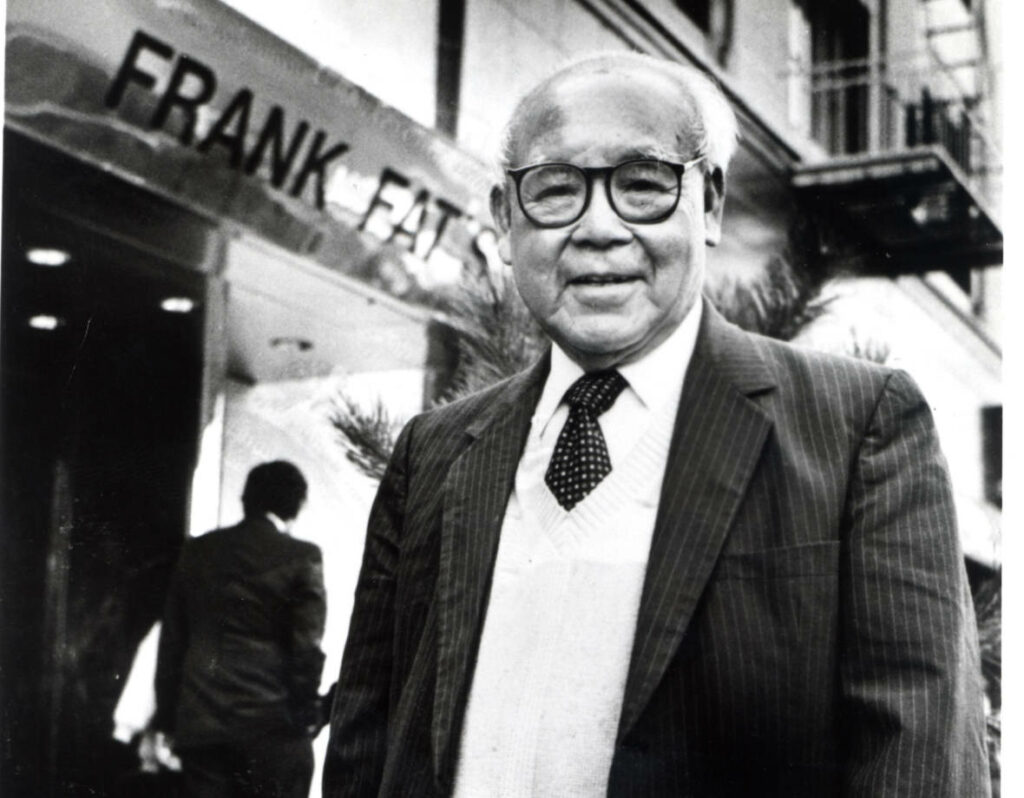
Frank Fat, Sacramento, Restaurateur
Shortly after Dong Sai Fat was born in Toishan in 1904, his father left for the U. S. as a paper son to earn money for his family. In Canton, Sai Dong worked in a restaurant for two years for only room and board. When he was 16 in 1919, his father purchased a paper identity of Wong Bing Yuen for him to immigrate to the U. S., where he would later adopt as his American name, Frank Fat.
His uncle emigrated earlier and was running a restaurant in Sacramento, California. He could not afford to hire Frank, but he provided him with board and a place to sleep in the basement in return for working in the restaurant. Frank also took a few odd jobs, including picking fruit in orchards, but the earnings were meager. So he soon left with a cousin to work in a laundry in Akron, Ohio.
There, Frank managed to contact his father, then employed as a restaurant cook in nearby Cleveland. He moved there and worked for a while, side by side with his father. Frank’s father unwisely decided to open his own restaurant in Youngstown , Ohio, but it was a failure. His father left for China for a period before returning to Sacramento.
At age 20, Frank returned to his Guangdong village to marry in an arranged match. He remained for over a year and fathered a son.
Then Frank joined an older cousin who was a retired merchant in a venture in Canton. There, with the aid of loans from his cousin, he led an active and carefree social life. However, when his cousin suddenly died, Frank decided to return to the U. S. alone in 1926 to earn money to repay his loans and to provide for his wife and son, whom he left behind.
This was the period of the Great Depression, so it was difficult to earn a living. Frank worked in a succession of jobs as a waiter in Chinese restaurants in Grand Rapids, Michigan, and Chicago, Illinois, until 1930. Then he moved to join his uncle in Sacramento, who had just remodeled the Hong King Lum Restaurant, and even added a dance floor. Located near the State Capitol building, it did a brisk business with all the state politicians and lobbyists. It was in this setting that Frank, with his charming and outgoing personality, became a very successful businessman.
In 1939, an old restaurant in a run-down area of downtown Sacramento was for sale. Frank felt confident that he could make it into a successful enterprise. Although his friends were skeptical, he felt that this place, located two blocks from the State Capitol, was better located than Hong King Lum, and he made the decision to start his restaurant there. His family’s meager savings combined with a business loan enabled him to buy and remodel the restaurant, which he renamed Frank Fat’s.
Putting in 16 hours daily alongside his 12 employees, Frank gradually established the business. He served a full lunch for 35 cents, dinner for 85 cents and gave ladies fresh gardenias on Friday nights. Frank installed a window between the dining area and the kitchen, so patrons could see the sanitary meal preparations for themselves, effectively squelching the common rumors of dirty Chinese restaurant kitchens.
After eight months, Frank Fat’s was turning a profit and attracting a clientele from the Capitol and other businesses. Therefore, Capitol denizens were lured, mostly by Frank’s unfailing graciousness and willingness, to accommodate his clientele. During after-hours, lawmakers and lobbyists could forget the differences of the day and indulge in drinking and gambling.
Combined with his hosting skills and the friendships he had cultivated for years at Hong King Lum, his restaurant prospered, and Frank Fat’s became a gathering place for influential state legislators, lobbyists, and other government employees, to dine and conduct business. After 32 years, Frank retired in 1971, but his sons and their families continued operations and the restaurant remains a success and popular dining spot in the region.
